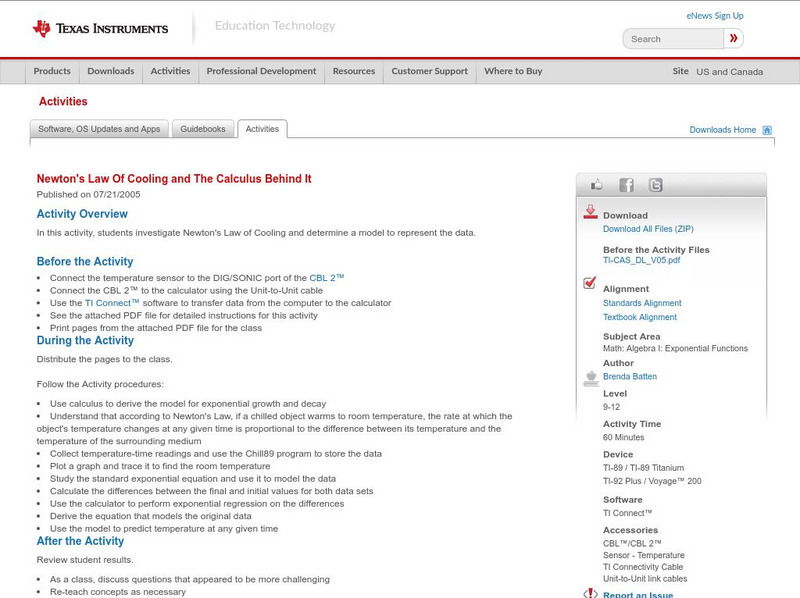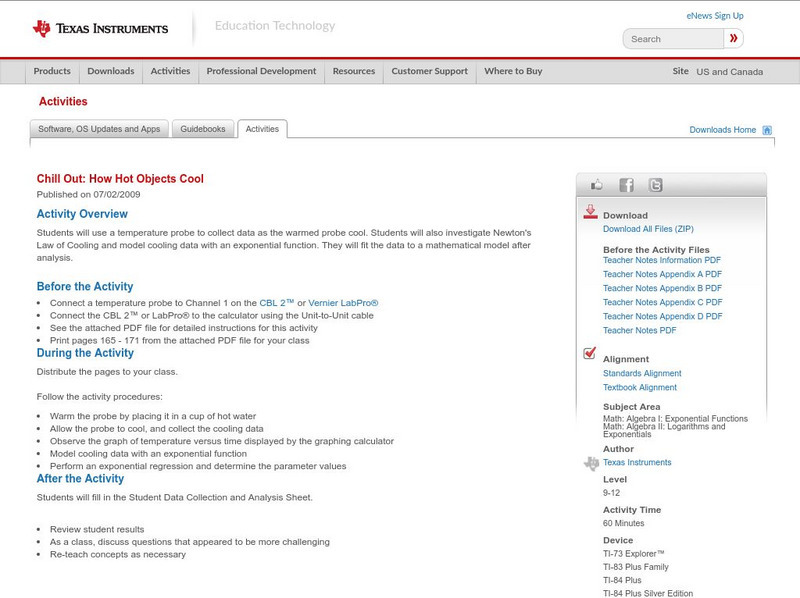Curated OER
Dead Body Math
Students solve the mystery of dead Mr. Potato Head using physics and algebra. They discuss Newton's Law of cooling as it applies to the mystery scenario involving a cooling baked potato as the "victim". They manipulate algebraic...
Curated OER
Chill Out
Students investigate Newton’s Law of Cooling. For this Algebra II/ Pre-Calculus lesson, students explore exponential regression as they conduct an experiment to simulate the temperature variations that occur as a liquid cools. The...
Texas Instruments
Texas Instruments: Newton's Law of Cooling and the Calculus Behind It
In this activity, students investigate Newton's Law of Cooling and determine a model to represent the data.
Texas Instruments
Texas Instruments: Applications of Integrals
Use the TI-89 to find the area between curves, find arc length, and solve first and second order differential equations. Examples in the activity use calculator screenprints and keystroke instructions to demonstrate the use of the...
Texas Instruments
Texas Instruments: Chill Out: How Hot Objects Cool
In this activity, students can use a temperature probe to collect data as the warmed probe cool. Students will investigate Newton's law of cooling and model cooling data with an exponential function. They will fit the data to a...
Math Medics
S.o.s. Math: Differential Equations Newton's Law of Cooling
This math lesson shows how differential equations apply to Newton's Law of Cooling.
Analyze Math
Analyze Math: Applications of Differential Equations
Scholars examine applications of differential equations. Examples explore how differential equations are used to model population, Newton's law of cooling, and engineering systems.
Science Struck
Science Struck: Conduction, Convection, and Radiation
Explains the concept of heat transfer and describes conduction, convection, and radiation which are the three modes of heat transfer. Includes formulas, examples, and applications.
Illustrative Mathematics
Illustrative Mathematics: F Le Newton's Law of Cooling
For this problem, students use an exponential equation to investigate the cooling of a cup of coffee and how long it would take for it to cool down to different temperatures. Aligns with F-LE.B.5 and F-LE.A.4.
University of Sydney (Australia)
Thermal Physics Module/heat Transfer 1 [Pdf]
The first of two pages discussing the different forms of thermal energy transfer. Equations expressing the rate of energy transfer by each of the methods are provided and discussed.
Other
Applied Thermodynamics: Heat Transfer
Heat transfer, rates of heat exchange,conduction, radiation and convection are defined and discussed at this site from Applied Thermodynamics. Well illustrated.










